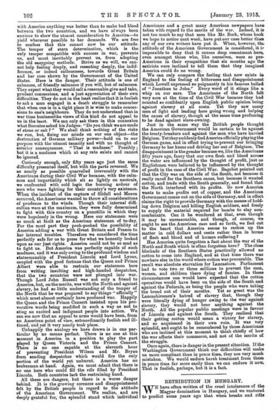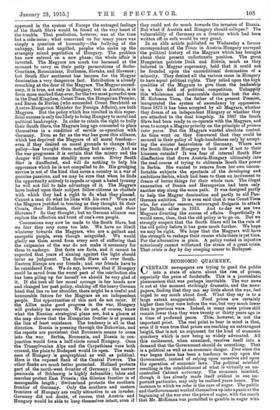RETRIBUTION IN HUNGARY.
WE have often written of the cruel intolerance of the Magyar domination in Hungary, and we ventured to predict some years ago that when breaks and rifts appenred in the system of Europe the outraged feelings of the South Slave would be found at the very heart of the trouble. That prediction, however, was at the time but a side-issue ; what concerned us for many years was simply a question of humanity—the bullying of the unhappy, but not ungifted, peoples who make up the strangely mixed population of Hungary. The problem has now entered on a new phase; the whole affair is inverted. The Magyars are much too harassed at the moment to carry on their petty persecutions of Serbo- Croatians, Roumanians, Ruthenes, Slovaks, and Slovenes ; but South Slav sentiment has become for the Magyar domination a very dangerous fact. Retribution is already crouching at the door of the Magyars. The Magyar ascend. ancy, it is true, not only in Hungary, but in Austria, is in form mom marked than ever, for the two most powerful men in the Dual Kingdom, Count Tisza, the Hungarian Premier, and Baron de Burian (who succeeded Count Berchtold as Austro-Hungarian Minister for Foreign Affairs), are both Magyars. But the policy which has resulted in this super- ficial success is only too likely to bring Hungary to moral and political bankruptcy. In order to retain the right to bully their South Slave, the Magyars long ago consented to place themselves in a condition of servile co-operation with Germany. Even so far as the war has gone this alliance, which has deprived the Magyars of all moral freedom— even if they desired on moral grounds to change their policy—has brought them nothing but misery. And as the war progresses it is certain that the misery and the danger will become steadily more acute. Every South Slav is disaffected, and will do nothing to help his oppressors which be is not compelled to do. His grudging service is not of the kind that saves a country in a war of genuine passions, and we may be sure that when be finds the opportunity actively to impede or upset a bated tyranny he will not fail to take advantage of it. The Magyars have looked upon their subject fellow-citizens as chattels with which they had a right to do what they pleased. Cannot a man do what he likes with his own? Were not the Magyars justified in treating as they thought fit their Croats, their Ruthenes, their Roumanians, and their Slovenes ? So they thought ; but no German alliance can replace the affection and trust of one's own people.
Concessions may now be made to the South Slays, but we fear they may come too late. We have no illwill whatever towards the Magyars, who are a gallant and energetic people, even though misguided. We would gladly see them saved from every sort of suffering that the exigencies of the war do not make it necessary for them to undergo. But facts are facts, and it cannot be expected that years of sinning against the light should incur no judgment. The South Slays all over South- Eastern Europe are our friends; and our friends have to be considered first. We do say, however, that if Hungary could be saved from the worst part of the retribution she has been piling up for herself we should be very glad of it. If she took all her moral courage in her hands now and changed her past policy, shaking off the heavy German hand that lies on her shoulder, there might be a useful and honourable future for the Magyars as an independent people. But opportunities of this sort do not recur. If the Allies make good progress in the war, Hungary will probably be overrun. We do not, of course, know what the Russian strategical plans are, but a glance at the map shows that the Hungarian frontier is at present the line of least resistance. The tendency is all in that direction. Russia is pressing through the Bukowina, and the reports are persistent that Roumania means to come into the war. Serbia, Roumania, and Russia in con- junction would form a half-circle round Hungary. Once the Transylvanian Alps and the Carpathians were both crossed, the plain to Budapest would lie open. The weak- ness of Hungary is geographical as well as political. Here is the exposed flank of the Central Powers. The other flanks are much better protected. Holland protect, part of the north-west frontier of Germany ; the narrow peninsula of Schleswig is highly defensible ; lakes and marshes protect East Prussia; the Silesian frontier is of manageable length ; Switzerland protects the southern frontier of Germany. Only the southern and eastern frontiers of Hungary are really attractive to an invader. Germany did not doubt, of course, that Austria and Hungary would be able to keep themselves intact, even if
they could not do much towards the invasion of Russia. But what if Austria and Hungary should collapse ? The vulnerability of Germany on a frontier which had been written off as safe would be very great.
In an able article published on Wednesday a former correspondent of the Times in Austria-Hungary surveyed the political history of the Magyars which has brought about their present unfortunate position. The great Hungarian patriots Deak and Eiitvos, much as they believed in Magyar supremacy, held that it could not be founded upon the unconditional domination of a minority. They desired all the various races in Hungary to have equal political rights. They relied upon the high qualities of the Magyars to give them the leadership in a fair field of political competition. Unhappily this wholesome and honourable doctrine lost the day. M. Koloman Tisza, the father of the present Premier, inaugurated the system of ascendancy by oppression. Since 1875 it has been accepted by all Magyars, whether they dream of an independent Hungary or whether they are attached to the dual kingship. In 1867 the South Slays had been ready to co-operate with the Magyars, and even to accept a Magyar priority on the principle of primes inter pares. But the Magyars wanted absolute control. As time went on they discovered that they could be secured in their policy of high-handedness only by accept- ing the sinister benevolence of Germany. Where are the South Slays of Hungary to look now if not to their kinsmen outside? It was fear of internal South Slav disaffection that drove Austria-Hungary ultimately into the mad course of trying to obliterate South Slav power in Serbia. She wanted to remove from her own uncom- fortable subjects the spectacle of the developing and ambitious Serbia, which had been to them an incitement to dream of better things for their whole race. The illegal annexation of Bosnia and Herzegovina had been only another step along the same path. It was designed partly to help the Magyar domination and partly to aid Pan- German ambition. It is even said that it was Count Tisza who, for similar reasons, encouraged Bulgaria to attack her Balkan allies in 1913. And to-day we see two Magyars directing the course of affairs. Superficially it would seem, then, that the old policy is to go on. But we strongly suspect that the South Slays will be the ruin of the old policy before it has gone much further. We hope we may be right. We hope that the Magyars will have the strength to reshape their course while there is yet time. For the alternative is plain. A policy rooted in injustice notoriously cannot withstand the strain of a great crisis. That crisis is day by day creeping nearer to Budapest.



































 Previous page
Previous page